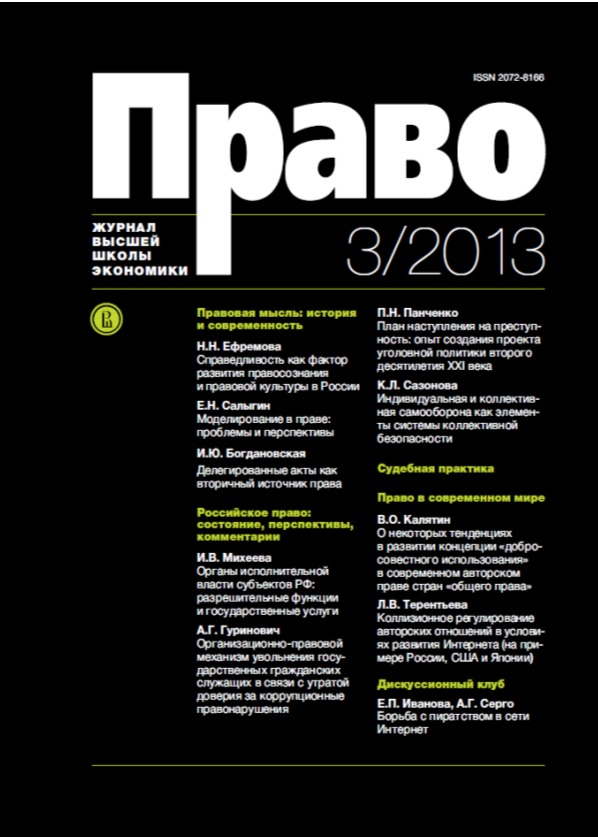Justice as a Factor Developing Legal Consciousness and Legal Culture in Russia
Abstract
The article is devoted to 150th anniversary since the publication of Court Rules to be celebrated November 20th, 2014. The laws incorporated in the document had become the pillar for the “Great” judicial reform having lasted for 35 years and aimed to establish court which would be equal, merciful and just created a new liberal democratic model of justice absorbing the best practice of Western judicial institutions and own cut and try principles and institutions. Overall, the tasks set by the Fathers of the reform as to modernizing judicial system and judicial process were performed. Justice was the ideological category which determined institutional and functional basis of a new justice. The latter promoted to the development of professional legal attitude of lawyers and hence attitude of laymen to law. In turn, it contributed to legal culture in Russian society contradicting the immanent legal nihilism typical of it and based mostly on nonconfidence and contempt to court and judges of the pre-reform period.
References
Berdyaev N. (1991) Samopoznanie [Self-cognition]. Moscow, Mysl, 391 p.
Bol'shakova O. (2011) Sudebnaya reforma 1864 goda i formirovanie pravovoy kultury v dorevolutsionnoy Rossii (obzor angloyazychnoy literatury) [Judicial Reform of 1864 and Formation of Legal Culture in Russia before the Revolution]. Available at: http//bibliotekar.ru/buharin/5 (accessed 04.06.2013)
Chicherin B. (1998) Filosofiya prava [Philisophy of Law]. Saint Petersburg, Nauka, pp. 160-165.
Efremova N. (2007) Stanovlenie i razvitie sudebnogo prava v Rossii 18 — nachala 20 v. [Formation and Development of Judicial Law in Russia in the 18th — early 20th Century]. Moscow, RUDN, pp. 13-21.
Filler L. (2007) Moral' prava [Morality of Law]. Moscow, IRI SAN, pp. 188-189.
Khairullin V. (2009) Kategoriya spravedlivosti v istorii politico-pravovoy mysli [Category of Fairness in the History of Political and Legal Thought]. Moscow, URSS, pp. 83-84.
Koni A. (1914) Otsy i deti sudebnoy reformy (k pyatidesyatiletiyu Sudebnykh Ustavov) [Fathers and Sons of Judicial Reform (in Commemoration of the 50th Anniversary of Judicial Statutes)]. Moscow, I.D. Sytina, pp. 111-114.
Korkunov N. (1999) Problemy prava i nravstvennosty [Problems of Law and Morality]. Saint Petersburg, Aleteya, 135 p.
Mel'nik V. (1999) Bozhestvennaya Pravda i spravedlivost' pravosudiya [Devine Truth and Fairness Ofjustice]. Moscow, Rossiyskaya yustitsiya, p. 10.
Nevolin K. (1997) Entsiklopediya zakonovedeniya [Encyclopedia of Law Studies]. Saint Petersburg, SPbGU, pp. 41-42.
Taranovski T. (1992) Sudebnaya reforma i razvitie politicheskoy kultury Tsarskoy Rossii [Judicial Reform and Development of Political Culture in Monarchial Russia]. Moscow, Progress, 308 p.
Wortman R. (2004) Vlastitely i sud'y. Razvitie pravovogo soznaniya v imperatorskoy Rossii [Rulers and judges. Development of Legal Consciousness in Imperial Russia]. Moscow, Novoe literturnoe obozrenie, 405 p.
Wortman R. (1976) The development of a Russian legal consciousness. Chicago, pp. 208-218. DOI: https://doi.org/10.7208/chicago/9780226907772.001.0001
Copyright (c) 2013 Law Journal of the Higher School of Economics

This work is licensed under a Creative Commons Attribution-ShareAlike 4.0 International License.


















